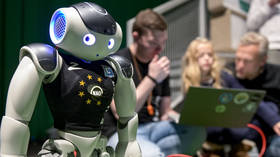Is this the way to prevent the RISE OF THE MACHINES? Tech experts unveil new AI design method

The prospect of rapidly-developing thinking machines conjures up images of Terminator bots or Black Mirror dystopias, but now a group of tech researchers claim to have developed a method of curbing bad AI behavior.
“When someone applies a machine learning algorithm, it’s hard to control its behavior,” said lead author Philip Thomas from the University of Massachusetts Amherst.
The key issue, according to Thomas and his fellow researchers, is not to try teaching computers to act morally, but to design the machine-learning algorithms so that they’re much easier for the (human) user to later add in constraints that make the AI safer and fairer.
Also on rt.com Deutsche Bank deploys an army of robots to replace 18,000 workersThe team came up with a framework they called ‘Seldonian’ algorithms, named after a character created by sci-fi writer Isaac Asimov, with which users can specify undesirable behavior as per their own needs.
Thomas gives the example of using their algorithm when controlling an insulin pump for diabetes treatment and specifying that undesirable behavior means dangerously low blood sugar. “Most algorithms don’t give you a way to put this type of constraint on behavior; it wasn’t included in early designs,” he explains.
In research published in Science, the team tested their Seldonian algorithm to predict grade point averages for 43,000 students in Brazil, and say it resulted in successfully overcoming several types of gender bias.
Also on rt.com One giant leap for robot-kind? Russian humanoid robots slated for spacewalks & moon missionsThe researchers, who hail from UMass Amherst and Stanford in the US, and the Federal University of Rio Grande del Sol in Brazil, are calling on others in the field to continue their avenue of research for the development of more responsible machine learning.
Think your friends would be interested? Share this story!













